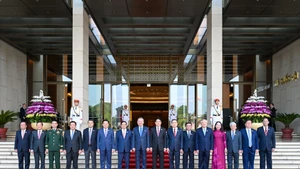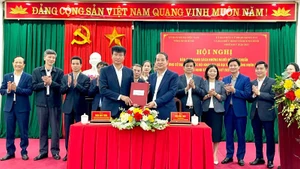Minor technical errors were promptly addressed and resolved to ensure the system remained uninterrupted. According to reports, the city’s shared software system has essentially been operating stably, meeting the needs of departments, agencies, and all 168 wards, communes, and special zones.
At Hoa Hiep Commune, the area farthest east from the city centre and bordering Lam Dong Province, it was noted that the shared digital platforms have been implemented quite effectively. The internet connection is stable, and the coordination between the on-site technical staff from the City’s Digital Transformation Centre and commune-level officers has been smooth, enabling timely resolution of any operational issues.
In An Thoi Dong Commune, where residents must travel long distances to administrative offices due to the large geographical area, the local government has proactively set up additional application intake points to facilitate access. As a result, operations have proceeded smoothly. In several other peripheral wards and communes far from the city centre, the shared software system has also been operating steadily.
After one week under the new governance model, Nguyen Thanh Luat, Vice Chairman cum Director of An Phu Ward Public Administrative Service Centre, stated: To best serve the needs of citizens and businesses in handling administrative procedures, the Centre has set up 12 counters with 14 staff covering all areas, and training was provided to personnel well in advance; in addition, the internet connection has been upgraded to high-speed.
The staff were carefully selected based on their expertise in the areas they manage, enabling them not only to process and return application results but also to directly advise residents on their queries. During the first week, the Centre received approximately 250–300 applications per day, mainly in the areas of justice, civil status, and certified copy services. In general, operations ran smoothly and citizens were quite satisfied.
According to Vo Thi Trung Trinh, Director of the Ho Chi Minh City Digital Transformation Centre, the system has basically met practical work requirements. Furthermore, because of multiple rounds of trial operation and training, the staff are quite proficient in handling tasks. However, the official rollout did see some issues arise, as ministry- and sector-level systems are also in the process of being upgraded to align with the new two-tier governance model; the current IT infrastructure is not yet fully stable, leading to occasional delays in processing applications at some ward and commune units.
Lam Viet Thao, Vice Chairman cum Director of the Tan Son Nhat Ward Public Administrative Service Centre, said: In recent days, citizens have mostly come for administrative procedures during the time slot from 9:00 to 10:30 a.m., mainly for services such as certified copies, notarisation, judicial matters, civil status, and business registration. Staff have generally handled the workload well and been friendly to citizens. However, there has been a minor issue with system connectivity being occasionally unstable. We have taken note and implemented timely solutions. Each application is still processed within 5–10 minutes.
At Saigon Ward, Bui Truong Giang, Deputy Director of the Ward’s Public Administrative Service Centre, said: The Centre has been operating smoothly and efficiently. The Centre has received feedback from citizens who wished to register businesses online but encountered system errors when logging in via VNeID, especially during working hours, forcing some to visit the Centre for direct assistance.
To address connectivity issues, the Centre has collaborated with infrastructure service providers to upgrade the network; at the same time, intensive training sessions have been conducted for local officials. Additionally, the Centre has established a technical support team of two staff per ward or commune unit to promptly address any arising issues, ensuring seamless and continuous operation of the system. From practical experience, the Ho Chi Minh City Digital Transformation Centre believes that in the near future, wards and communes should continue to invest in completing their IT infrastructure to ensure synchronisation and connectivity with the city-wide shared systems.
The Centre will focus on enhancing user experience across digital platforms serving citizens and businesses. “We are accelerating the integration of full and partial online public services into a unified, user-friendly service portal; we are also adding more features to the City Digital Citizen App to provide practical utilities for residents’ daily lives related to healthcare, education, employment, social welfare, and urban information,” Vo Thi Trung Trinh shared.
















